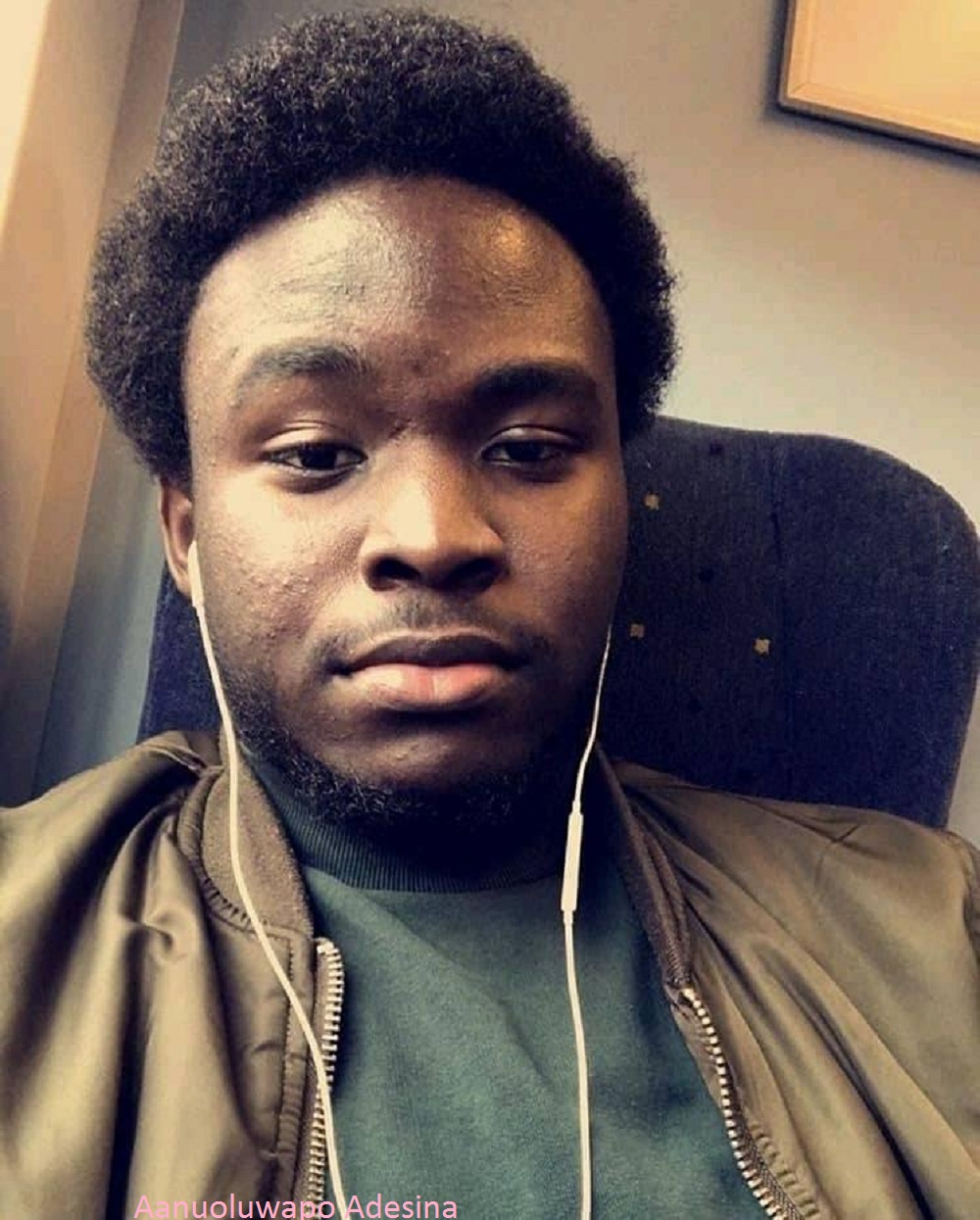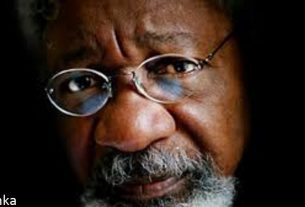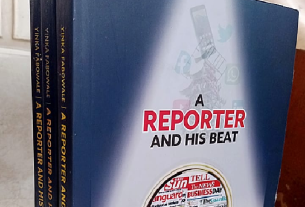Twenty-year old poet, literary scholar and 2018 Coventry University First Class Honours graduate, Aanu Adesina speaks on his inspiration in a chat with Oyeyinka Oludayisi Fabowale.
Anuoluwapo Adesina has his path as a scholar, writer and artist cut out early in life. He was born into a family of educationists, with a long and proud pedigree of flourishing intellectual and creative exploits.
His parents are Prof Olutayo Charles Adesina, a fellow of the Nigerian Academy of Letters and former Head of Department of History, University of Ibadan, and Dr Olukemi Adesina, teacher in the same discipline at the Redeemer’s University, Ede, Osun State. His grand-parents were also tutors – the late Pa John Oyetade Adesina, who retired as the strict, disciplined Principal of St. Charles Grammar School, Osogbo, and the late Mrs Ruphina Olajumoke Adesina, who also taught before she retired into trading.
Surrounded by books in his childhood and gifted with a journalist-uncle, Femi Adesina, (former Managing Director/Editor-in Chief, The Sun Newspapers, and now Special Adviser, Media Publicity to President Muhammadu Buhari), and an aunt who was an actress, movie maker and former Head of Department of Dramatic Arts, Obafemi Awolowo University, Ile Ife, the late Prof Foluke Adesina – Ogunleye, it is not a surprise that he is imbued with creative talents. At 20, the young Aanuoluwapo, set a record as a Nigerian student to graduate at Coventry University, United Kingdom, with a First Class honours Bachelors of Arts degree in English and Creative Writing.
Aanuoluwapo, who is now a teaching assistant at Kennesaw State University, Georgia, United States, where he is pursuing a Master of Arts in Professional Writing, is also a writer, poet and comedian/ dramatist, who created the popular online comedy video series. “Iya Aanu” (Aanu’s Mother), which depicts the experiences and relationship between average African youth and their parents.
“Emocean”, his first anthology, published by Bookcraft, is a newly hatched egg that reveals a chick with all features and promise of growing into a sturdy, bright feathered and delightfully cackling cockerel. In it, we meet a budding literary genius and wordsmith, with a refreshing voice and incredibly powerful language which, in its uniqueness and force, stirs the depths of the soul and compels the audience to share in his worldview.
In this interview, the otherwise shy young literary scholar speaks on his background, creative enterprise, as well as his experience and thoughts on Nigerian educational system vis-à-vis that of the West, among other issues.
You are a poet, writer and can I say dramatist too. How did you come about your creative talent?
I’m not entirely sure how, but I can say that we all have our innate abilities. For one, I can’t solve mathematical questions to save my life, yet I have a sister who is incredible at all activities math related. So, in the same way, I’m better with words, and with many thanks to my parents, who supported this and provided me funding to further develop my abilities I have been able to improve my writing significantly.
Your muse: – what inspires your poetry and other literary preoccupation?
When I first began writing, poetry was my preferred form. I felt it lent itself well to unexplainable emotions, as such concepts could be presented directly to the reader. My poetry usually deals with themes such as death, war, love, sadness and betrayal. I just recently developed an interest in the short story form. In this form, I’ve dealt with violence, corruption, religion and evil as themes. I wouldn’t say I have a specific audience, but I believe teenagers and adults would be able to relate better to my works, regardless of background. The title of my first poetry collection and published work is “Emocean.” I had created the title as a pun for an ocean of emotions, describing the volatile nature of emotions as relatable to the temper of the sea.
Your literary heroes and models: how many have you met and would like to meet?
I met Wole Soyinka and J.P. Clark last year while in Nigeria. I had attended a conference in honour of Nigerian poet, Christopher Okigbo. I took advantage of the opportunity to speak to them both and also provide them with copies of my collection.
You were initially studying Dramatic Arts at OAU, Ile-Ife, before you left Nigeria. Are we to assume that, that’s the end to that interest?
The Dramatic Arts programme was a bit too much for me. Its physical demands far exceeded what I had anticipated. I do understand that given the numerous genres in this field, and the inherent inter-textuality, which they possess, it would be beneficial to be able to function in whatever capacity demanded. So, I am prepared to venture wherever the wind blows.
Tell us about the comedy skit video series you created and broadcast online, ‘Iya Aanu’ and other stuff. It seems to have stopped?
In my First Year of Undergraduate studies, I had found the need to learn Yoruba, given the isolation I experienced. I had grown lonely because I was the only Nigerian on my course, thereby restricting my mode of expressing myself as Yoruba and Nigerian to just my writing.
I had created the fictional character, Iya Aanu, based on the experiences and traits of my mother, many of which were legitimate or for the devised for the sake of entertainment. I then took up the study of Yoruba adages as a vehicle of language acquisition. I then came up with the idea of developing this into comedy shorts (skits) which had become increasingly popular at this period due to the brevity required in delivering entertainment, a trait I thought caused them to endure longer in the memories of people.
Several people were doing this at the time, such as Mama Tobi (Oluwatobi Adeshina Onibatedo), Aphrican Ape (Dami Olatunde), Twyse(Abraham Ereme) Akanm D Boy(Ayokanmi Fakeye) among others. One similarity, which I had identified that I shared with these people, was that we were all individuals of Nigerian descent, who were schooling/living abroad. I used this activity as a way of engaging directly with the writing demands of my course in thinking up new stories and scenarios.
I had begun garnering a large following, my Facebook reaching at a point an audience of 20,000 people. However, one thing soon became apparent, especially in the cases of the comedians mentioned above; it was a difficult enterprise.
I did not have the flexibility nor the time to meet those demands. As they grew popular, these comedians would have to fly to Turkey, England and various countries to perform. I didn’t think I would be able to cope with that sort of life, so I made the executive decision to focus more on my writing, primarily since I was about going to my Second Year, anticipating a higher course load.
You bear striking physical traits with Nobel laureate Prof Wole Soyinka in a picture of his youth. And you seem to be on a trajectory of scholarly and artistic/creative excellence as his. Could you deliberately be cultivating the resemblance, perhaps, out of childhood fantasy or fondness for the literary icon?
I don’t think I want to be like him. My view of him is merely one of respect as a senior and accomplished literary colleague. I suppose this is why I’ve always found it problematic seeing anyone as beyond an inspiration, as I believe there’s a thin line between being inspired and idolising. If one were to worship another individual, not only would that person not enjoy any notable significance in his/her field, they would also unconsciously mimic that person’s ideas and thoughts.
How easy was it graduating with a First-Class Honours in a predominantly white academic community?
I think we can both agree that achieving a First in any community comes with its unique challenges. I had already been given a robust literary foundation as well as a work ethic during my time at Adesina College, which helped me to develop a determination not to settle for less. I was the youngest of my peers; who were much older than me and had all done A levels before pursuing University education. There was a vacuum of knowledge I had felt in that regard. However, this soon quickly disappeared as I was able to find my footing in good time.
How much did your parents’ profession as academics influence you as a scholar, your Uncle Femi Adesina as a writer and your late aunt (Foluke Adesina –Ogunleye) as an artist?
Having two parents, who are academics was the first influence I had. From a young age, I had understood what their careers were and deemed it a great and dignifying profession. I remember that in the days of my youth, I always wanted to be like my father: dress like him, talk like him, act like him as he represented my first contact with a university lecturer. Visiting both their offices when I was much younger exposed me to the respect that academics received; something I sought to have for myself.
Ironically, I had always wanted to be a lecturer when I was little, but I had wanted to become an archaeologist. I couldn’t tell you for the life of me what happened to that dream. I had a close relationship with my aunt, both personally and in the literary connection we shared. She had always given me novels since I was in primary school. I was expected to read them, and she would give me an A4 piece of paper on which I was supposed to summarise what I had learned.
It was from her study I had first read Strange Case of Dr Jekyll and Mr Hyde. Years later I would read this book in my First Year at Coventry University, where I wrote a paper titled: “A Feminist and Psychoanalytic Analysis of Strange Case of Dr Jekyll and Mr Hyde.” She introduced the art of writing to me, and I was very fortunate to have read and seen her works like Jabulile, Nest in a Cage and the Broken Edge. She had always been a massive support to me in all my writing endeavours. She had received the first manuscript of what is today known as Emocean. God bless her soul.
In which of these three directions do you see yourself being pulled?
I think this question would bring me back to the allure of having a foreign education. While I studied at Coventry, my course included the teaching of Stylistics, Journalism, Languages (of which I studied German and Mandarin) as well as Creative Writing.
All these aspects helped ensure that students can fit into whatever field they prefer; creating an instance whereby students would not lack in experience. One could argue that it is with such training that I can situate myself reasonably seamlessly in different fields and societies. I thank God for my parents, for this is indeed, the most excellent investment parents could make. I appreciate their love, support, and sacrifices dearly.
What informed the choice of your B.A dissertation topic? And what were the opinions of your professors?
My dissertation was titled, A Creative Analysis of Reality in Modern and Postmodern Short Stories. The title was borne of my interest in the concepts of Modernism and Postmodernism. From the research I had done, I had found that Modernism encouraged writers, who adopted this form, the ability to identify certain areas of social norms, which they had come to disagree with in the course of engaging with society as a whole. Rather than get into a full-on lecture regarding both concepts, I shall focus more on modernism and how it contributed to the short stories I produced in partial fulfillment of my creative dissertation.
I had come to Nigeria over the summer one year, as I usually did. It’s just so much as happened that during this time there was much discourse going on regarding tithing. I had engaged with different media sources; radio, newspapers, internet memes and the likes, to better grasp what the issue was. I had found that religious leaders had become adamant on retaining tithing as a major source of their income after it was deemed to be in jeopardy when people started questioning how those funds were used. Upon my return to England, I thought this issue had provided me with a rich source of inspiration that would lend itself well to the concept of Modernism. I wrote “Dogma,” a short story, as a satire which presented religion as a tool of mind control by religious institutions and political class as I observed it in the Nigerian state.
The Nation





